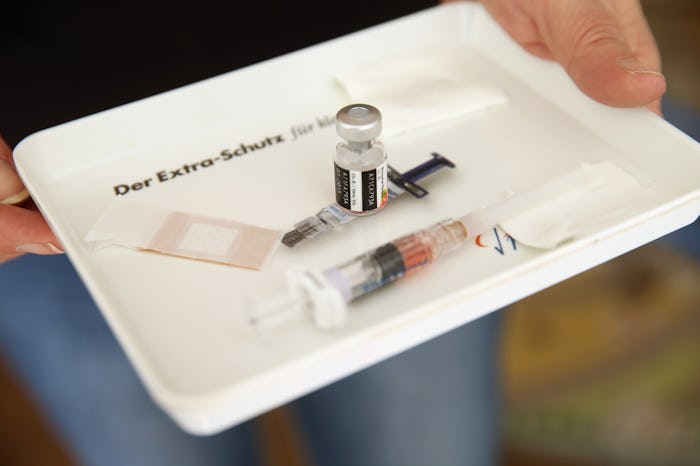Life

Changing Anti-Vaccine Language Doesn't Change Science
The anti-vaccination movement has received increased condemnation lately, particularly after recent outbreaks of preventable, sometimes-fatal diseases in areas where many parents had not vaccinated their children. Still, the movement continues to grow, and now, some anti-vaccine parents are trying to put a more positive spin on their stance by resorting to new, obfuscating language about what they believe. But changing anti-vaccine language doesn't change all of the science supporting immunization. Instead, this kind of language hinders real conversation about the issue, and promotes misinformation. It's the "alternative facts" of the anti-vax movement.
In a recent issue of Natural Mother Magazine, one anti-vaxxer laid out her recommended linguistic maneuvers when talking to others about the choice not to vaccinate. Rather than using the term "unvaccinated," blogger Guggie Daly wrote, parents should say their child is "vaccine-free" or, more misleadingly, that their child "has an intact immune system." And instead of referring to themselves as "anti-vaxxers" (media manipulation has made that term so "negative," Daly writes), anti-vaxxers can bill themselves as "vaccine safety advocates," following that up by saying, "I encourage transparency and better ethical standards from pharmaceutical companies." (Romper has reached out to the magazine for comment and is awaiting a response.)
The problem with all of this is that the science about vaccination is transparent — and what does it say? Vaccines are essential tools for protecting children.
A study in Pediatrics reviewed 20,000 scientific titles and 67 papers, and found no evidence for the most pervasive anti-vaccine myth — that vaccines are linked to autism. (The original paper that claimed to find evidence for the vaccine-autism link was later discredited and called an "elaborate fraud.") The in-depth Pediatrics study also found no links between vaccines and leukemia, and concluded that serious side effects from vaccines were "extremely rare."
There is, however, evidence for the damage caused by not vaccinating children. Back in 2010, a whooping cough outbreak in California left 10 infants dead in an area where significant clusters of the population were not immunized. Other recent incidents of preventable diseases popping back up again in cases linked to anti-vaxxing include a recent measles outbreak in an unvaccinated Amish community and an outbreak at Disneyland. And the decision not to vaccinate has repercussions outside of one's own household. Parents who do not vaccinate their own children put other children at risk too.
It's discouraging to see the anti-vaccine (or rather, the "vaccine safety") community focusing less on the vast body of scientific research supporting vaccination, while focusing more on how to manipulate language in order to spread acceptance for a dangerous choice.
No one should be bullied for their personal choices — but they should also be made aware of the repercussions that those choices might have on others around them. Words are just words — deadly diseases have actual consequences.